
Morning Brief – Local Elections – South Africa
Local Elections – South Africa
Domestic elections in South Africa have arrived amidst an already challenging time for the South African Rand. Having failed to hang on to gains associated with the liberalisation of travel and commerce following the latest wave of pandemic-induced restrictions, the Rand entered this week’s elections vulnerable to selling pressure. The moderation in commodity prices over the last week or two following a period of strong, almost daily, price rises has also undermined support for emerging market and commodity currencies across the board. Versus the Dollar, Euro and Pound, the Rand is approaching significant resistance levels having undergone a severe correction throughout the latter-half of October and into November. Against the Dollar and Pound, the move is particularly pronounced, leaving GBPZAR and USDZAR close to year-to-date highs.
It was immediately apparent following the vote on Monday that voter turnout was markedly low. Despite having lower salience than a general election, the municipal elections had frequently been presented as a referendum on the ruling ANC. The pandemic, critics of the incumbent party argue, has highlighted the insufficiency of the ANC as the ruling party in South Africa. Immediately, reports of low voter turnout created expectations of electoral underperformance for the ANC. This has subsequently been confirmed by the exit poll and the ongoing vote count suggesting that the incumbent party has secured less than 50% of the vote for the first time since 1994.
You may question why the underperformance of the ANC and low voter turnout could undermine the Rand, particularly if you share the opinion that critics of the incumbent party are swift to expose. The reason why markets have devalued Rand against its major peers whilst the result of the election unfolds is the propensity for political and in turn social risk in reaction to the vote. Due to the 27-year tenure of the ANC in South Africa, markets are wary of the potential for a turbulent rebalancing of power and less political cohesion in the critical months that follow for the local and indeed global economy. The risk presented by the elections has precluded the currency from reflecting fully any potential support it may have received from news of an $8.5bn receipt to tackle its reliance on coal during Cop26.
Discussion and Analysis by Charles Porter

Click Here to Subscribe to the SGM-FX Newsletter
Related Insights

Morning Brief – Japanese Yen
Japanese Yen With JPY at a new 34 year low versus EUR, the market is set for an ambush by the Bank of Japan if it acts today at the end of their Policy Meeting to support the Yen. The reason that the market is susceptible is because it has convinced itself that the BoJ […]

Morning Brief – Coalition
Coalition This briefing is about South Africa and the Rand, which frequently proves to be one of the more divisive subjects within our roster of currencies. In particular, with the election looming, this will be about South African governance. Not from a political or human perspective about what may be the best long term outcome […]

Morning Brief – US Tariffs on Chinese Imports
US Tariffs on Chinese Imports Recently we wrote about how Mexico has become the Number One trade partner for the USA. It now transpires that Mexico may have had what is known as a little assist with their numbers: the statistics for the number of 20 foot shipping containers for the first three Quarters of […]



 Humphrey Percy
Humphrey Percy Charles Porter
Charles Porter